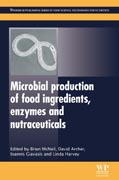
Microbial Production of Food Ingredients, Enzymes and Nutraceuticals
McNeil, B
Archer, Brad
Giavasis, I
Harvey, Bill
Bacteria, yeast, fungi and microalgae can act as producers (or catalysts for the production) of food ingredients, enzymes and nutraceuticals. With the current trend towards the use of natural ingredients in foods, there is renewed interest in microbial flavours and colours, food bioprocessing using enzymes and food biopreservation using bacteriocins. Microbial production of substances such as organic acids and hydrocolloids also remains an important and fast-changing area of research. Microbial production of food ingredients, enzymes and nutraceuticals provides a comprehensive overview of microbial production of food ingredients, enzymes and nutraceuticals.Part one reviews developments in the metabolic engineering of industrial microorganisms and advances in fermentation technology in the production of fungi, yeasts, enzymes and nutraceuticals. Part two discusses the production and application in food processing of substances such as carotenoids, flavonoids and terponoids, enzymes, probiotics and prebiotics, bacteriocins, microbial polysaccharides, polyols and polyunsaturated fatty acids.Microbial production of food ingredients, enzymes and nutraceuticals is an invaluable guide for professionals in the fermentation industry as well as researchers and practitioners in the areas of biotechnology, microbiology, chemical engineering and food processing. Provides a comprehensive overview of microbial flavours and colours, food bioprocessing using enzymes and food biopreservation using bacteriocinsBegins with a review of key areas of systems biology and metabolic engineering, including methods and developments for filamentous fungiAnalyses the use of microorganisms for the production of natural molecules for use in foods, including microbial production of food flavours and carotenoids INDICE: Bioprocessing as a route to food ingredients: An introduction. Part 1 Systems biology, metabolic engineering of industrial microorganisms and fermentation technology: Systems biology methods and developments for filamentous fungi in relation to the production of food ingredients; Systems biology methods and developments for Saccharomyces cerevisiae and other industrial yeasts in relation to the production of fermented food and food ingredients; Applying systems and synthetic biology approaches to the production of food ingredients, enzymes and nutraceuticals by bacteria; Production of foods and food components by microbial fermentation: An introduction; Fermentation monitoring and control of microbial cultures for food ingredient manufacture; Industrial enzyme production for the food and beverage industries: Process scale up and scale down. Part 2 Use of microorganisms for the production of natural molecules for use in foods: Microbial production of food flavours; Microbial production of carotenoids; Microbial production of flavonoids and terpenoids; Microbial production of enzymes used in food applications; Microbial production of organic acids for use in food; Production of viable probiotic cells; Microbial production of bacteriocins for use in foods; Microbial production of amino acids and their derivatives for use in foods, nutraceuticals and medications; Production of microbial polysaccharides for use in food; Microbial production of xylitol and other polyols; Microbial production of prebiotic oligosaccharides; Microbial production of polyunsaturated fatty acids as nutraceuticals; Microalgae as sources of food ingredients and nutraceuticals; Microbial production of vitamins.
- ISBN: 978-0-85709-343-1
- Editorial: Woodhead Publishing
- Encuadernacion: Cartoné
- Páginas: 656
- Fecha Publicación: 21/03/2013
- Nº Volúmenes: 1
- Idioma: Inglés
